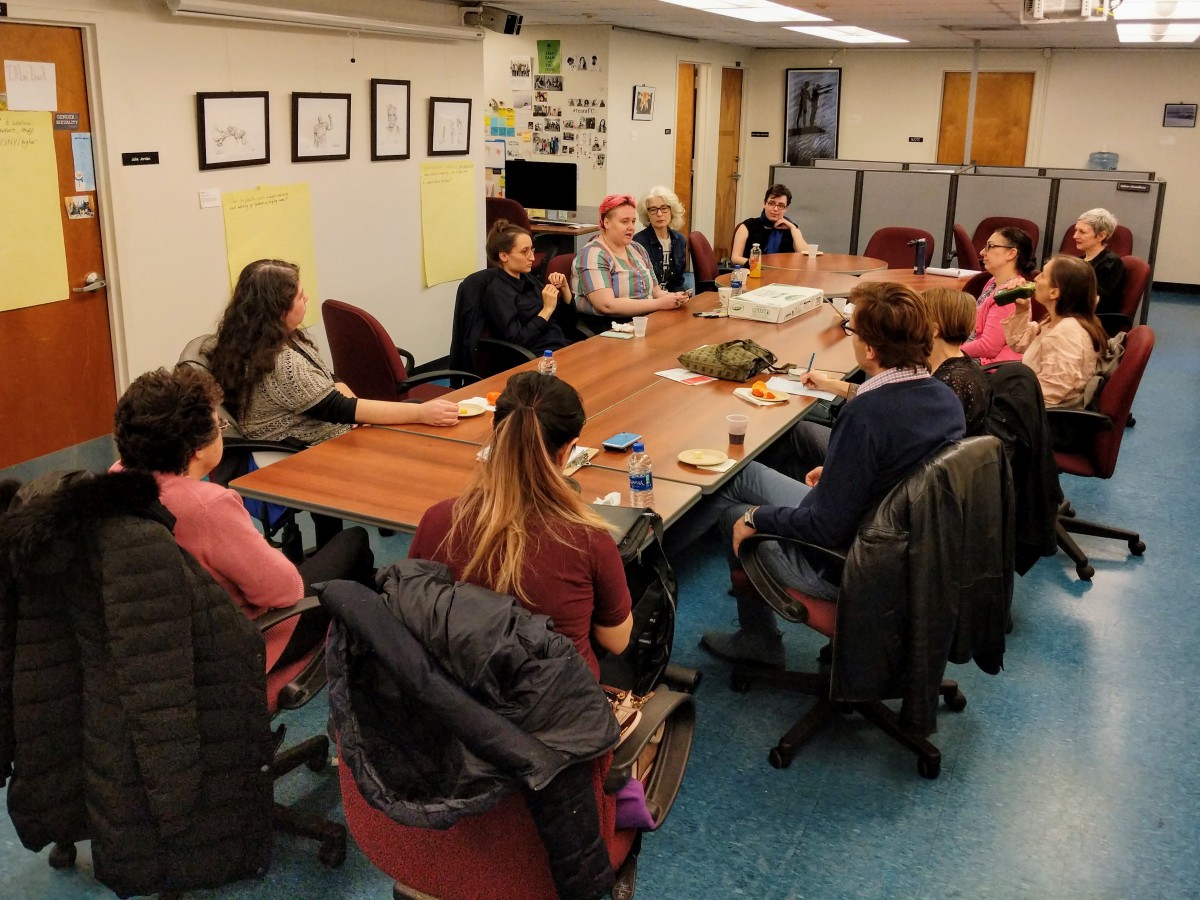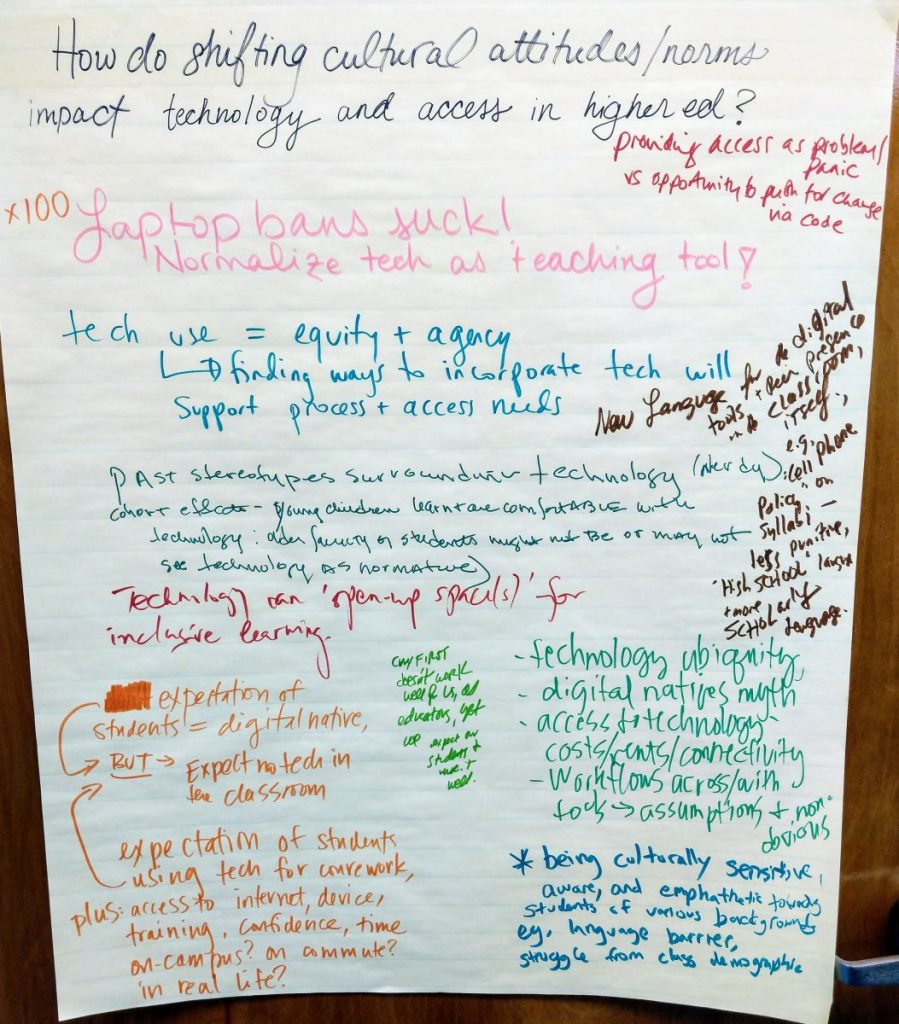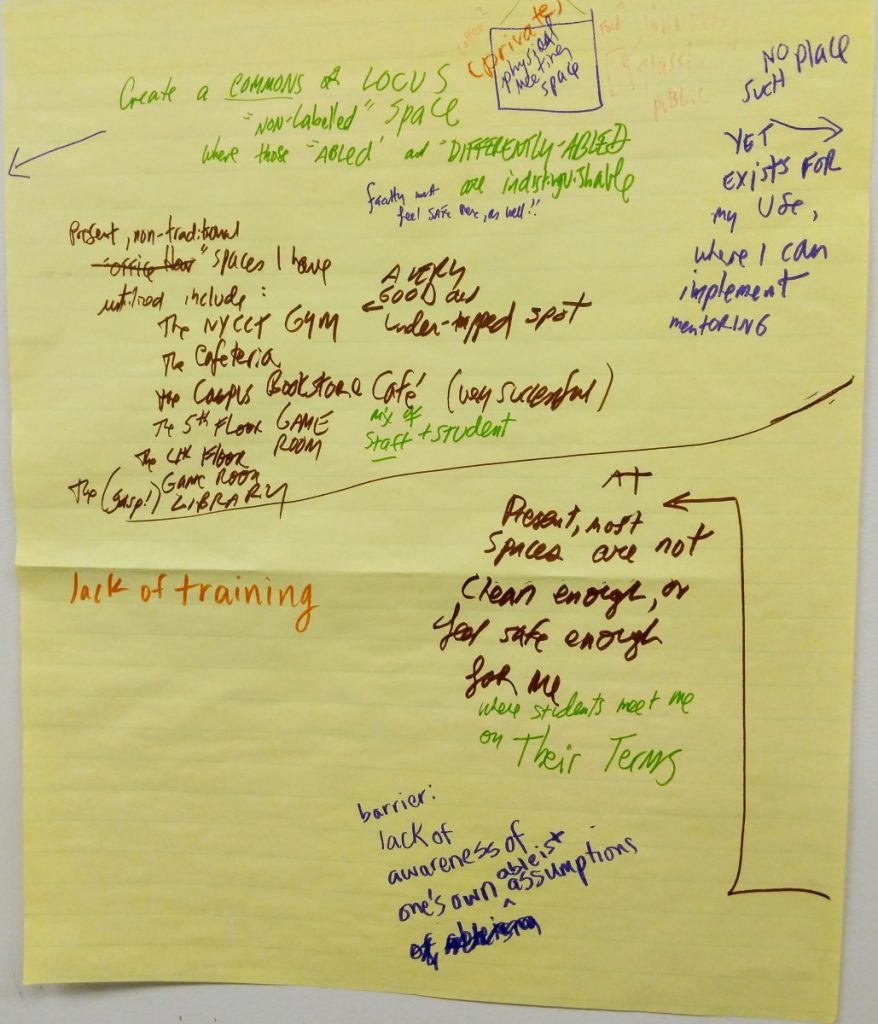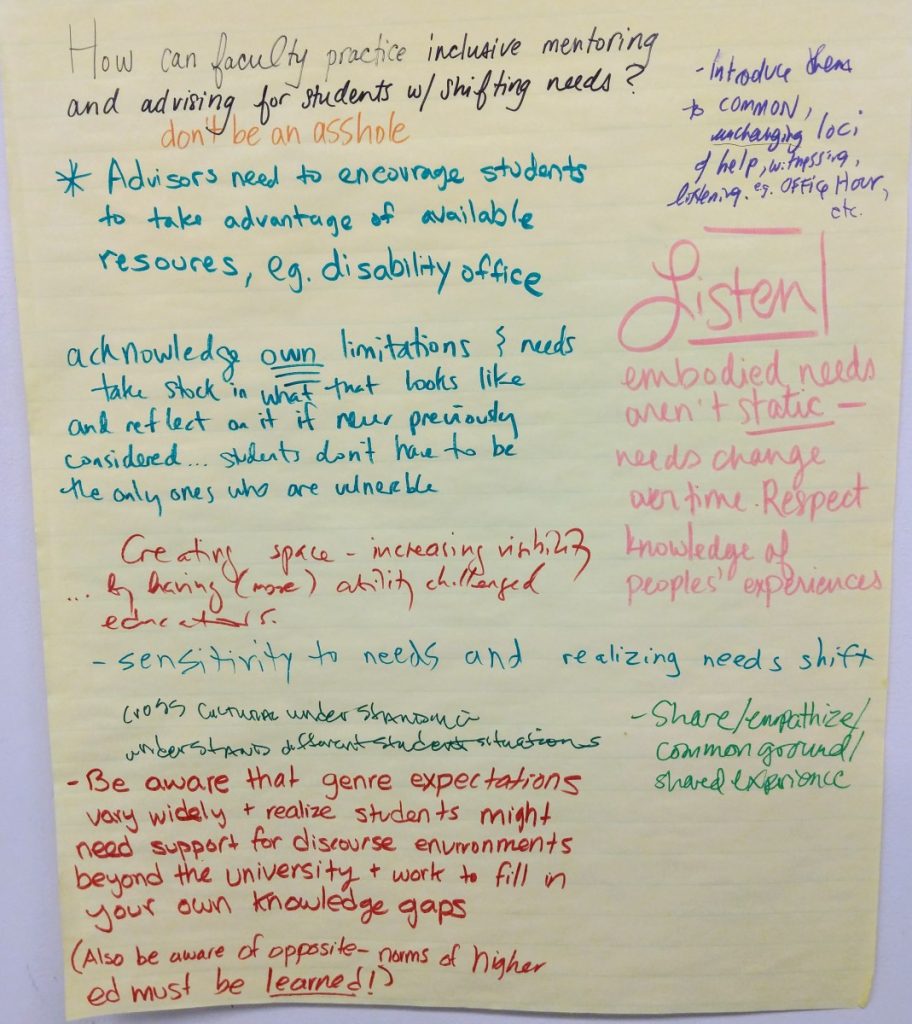Last Thursday, February 27, we met with faculty and staff from across CUNY for another Open Pedagogy session, the first of the semester and the third of the year. At previous Open Pedagogy events, we’ve discussed how federal guidelines like the ADA fall short of providing for student, faculty, and staff needs in higher education and how we can improve access in our pedagogy. This time, we continued the conversation by focusing on another aspect of our professional lives: Access in Service.
First, we introduced ourselves; we had participants from all over CUNY, including from City Tech’s own English, History, Psychology, Communications Design, and Business departments, LaGuardia Community College’s Center for Teaching and Learning, City College, and John Jay!
While folks talked about what attracted them to this Open Pedagogy session, we were livetweeting the event:
The OpenLab’s own digital pedagogy fellow, Claire, asks, what access (or lack of access) do part time faculty and grad student teachers have to training for how to best support students outside of class, like advising, helping with job applications, and writing recommendations?
— City Tech OpenLab (@CityTechOpenLab) February 27, 2020
Then, everyone got a chance to collect their thoughts by choosing and freewriting about one of our discussion questions:
- How can university faculty practice inclusivity in mentoring and advising disabled and non-disabled students with shifting and complex needs?
- How do shifting cultural attitudes and norms impact how we think about access in higher education? What kind of shifting norms come up around using technology to facilitate access?
- What barriers to access do you encounter when you advise students and mentor students, formally or informally? What strategies have you used to reduce these barriers, and how do you learn from others about access-centered service opportunities?
- How can we, as individuals and institutions, reframe access to consider the full range of what a person (student, staff/faculty member) encounters at the college?
Next, we grabbed our favorite color of marker and spread out to add our ideas to giant wall sticky notes! Check out everyone’s responses in the photos at the bottom of the post, as well as accessible transcriptions/textual descriptions of each sticky.
Then, we discussed each question as a group while looking at the collaborative notes and sharing/explaining our responses. Everyone interpreted the questions differently, so we had a beautiful variety of responses! Participants reported that the conversation left them with lots of ideas for how to adjust their pedagogy and service work to better serve the needs of everyone in our campus community.
Let’s continue the conversation! Once you’ve browsed through the responses from our session below, please comment on this post with thoughts/ questions.
Answers written on each sticky are numbered here for ease/accessibility; on the sticky, each answer was written in a different handwriting/color of marker.
First Sticky Transcript
Question: How do shifting cultural attitudes/norms impact technology and access in higher ed?
Answers:
- Providing access as problem/panic vs. opportunity to push for change via code
- Laptop bans suck! Normalize tech as teaching tool!
- Tech use = equity + agency. Finding ways to incorporate tech will support process + access needs
- New language for digital tools + their presence in classsrooom itself, e.g. “cell phone policy” on syllabi– less punitive, “high school” language + more scholarly language
- CUNY First doesn’t work well for us, as educators, yet we expect students to use it well
- Technology ubiquity, digital natives myth, access + technology costs/rents/connectivity, workflows across/with tools –> assumptions + non-obvious
- *Being culturally sensitive, aware, and empathetic towards students of various backgrounds, e.g., language barrier, struggle from class demographic
- Expectation of students = digital native, BUT expect no tech in the classroom, expectation of students using tech for coursework, plus: access to internet, device, training, confidence, time on campus? on commute? in real life?
Second Sticky Transcript
Question: What barriers to access do you encounter when advising/mentoring; how do you work to reduce the barriers?
Answers:
- I have only ever worked in higher ed (basically)- how to advise ppl with diverse career goals?
- Advisement knowledge –> college catalog, ask
- Educating students how to find resources + advocate for themselves
- Build in advisement/advocacy to my classes
- QUIET PRIVATE SPACE
- * Certain lack of equipment or resource to carry out a learning tool or projejct
- * Being fully aware of what the dept and full time faculty can provide and/or allow
- *Telling students what is possible but was not told to them from the admin department
- SHARED LANGUAGE
- CUNY First – confusing, hard to find things, no training, documentation/support???? [Someone else added to this: awful design)]
- My first teaching/advising/mentoring experiences were at the same place I did my undergrad, so I knew A LOT about the school. Not so much here.
- Time, lack of skills, lack of equipment, no computer at home, may be monetary issue
Third Sticky Transcript
Question: How can we [underlined] reframe “access” to address the full range of what higher ed students, staff, faculty encounter at City Tech/CUNY/higher ed?
Answers:
- I struggle w/ this b/c access still feels like accomodation when I discuss it in class w/ students
- Tech for All!
- We need both institutional accountability and a sense of informed individual responsibility to become a truly welcoming learning environment for students and workers
- TRY to pre-test or PUT MYSELF into the situation, first, before I ask the student to perform their task. i.e., I [underlined] talk to CATW; I try to access open lab, et al.
- WTH is a “reasonable accommodation”??? What do fac/staff do when only dis services office is “student dis services”???
- Use empowering language, Access provides low cost learning materials/tools, Access is social + professional
- Recognize people are differently abled–variety not disability
- Multiple channels + paths to resources and education about resources
- Raise awareness of access issues for faculty, not just students. It will matter to conversations about student access!
Fourth Sticky Transcript
[This sticky was placed in between two others, so some of these answers are in response to the question on the Second Sticky and some are in response to the question on the Third Sticky]
Answers in the section dedicated to Second Sticky:
- Lack of training
- At present, most spaces are not clean enough or feel safe enough for me
- Where students meet me on their terms
- Barrier: lack of awareness of one’s own ableist assumptions
Answers in the section dedicated to the Third Sticky:
- Create a COMMONS [underlined], LOCUS “non-labelled” space where those “abled” and “differently abled” are indistinguishable
- Faculty most feel safe as well
- Present, non-traditional spaces I have utilized include: The NYCCT Gym (a very good and under-tapped spot), The Cafeteria, The Campus Bookstore Cafe (very successful), the 5th Floor Game Room, the 4th Floor Game Room, the (gasp!) LIBRARY
- Mix of Staff [underlined] and student
- (Private) physical meeting space
- No such place exists yet, exists for my use, where I can implement mentoring
Last Sticky Transcript
Question: How can faculty practice inclusive mentoring and advising for students w/ shifting needs?
- Don’t be an assole
- * Advisors need to encourage students to take advantage of available resources, e.g. disability office
- Acknowledge own [underlined three times] limitations/needs, take stock in what that looks like and reflect on it as if never previously considered…students don’t have to be the only ones who are vulnerable
- Creating space- increasing visibility…by having (more) ability challenged educators
- Sensitivity to needs and realizing needs shift
- Cross cultural understanding, understand different student situations
- Be aware that genre expectations vary widely + realize students might need support for discourse environments beyond the university + work to fill in your own knowledge gaps (also be aware of opposite- norms of higher ed must be learned [underlined]!
- Introduce them to common unchanging loci of help, witnessing, listening, e.g. office hour, etc.
- LISTEN [box drawn around this word]. Embodied needs aren’t static [underlined] – needs change over time. Respect knowledge of people’s experiences
- Share/empathize/common ground/shared experience









